TOKYO (Reuters) -The U.S. dollar ticked up to a 2-1/2-month peak on Wednesday as investors adjusted bets toward a gradual reduction of interest rates while keeping an eye on a close presidential election race.
The yen was the biggest mover, sliding to 152 per dollar for the first time since July 31 as U.S. Treasury yields and the greenback continued to march higher.
The dollar has climbed for three weeks to hit its highest since Aug. 2 at 104.19 as expectations for aggressive interest rate cuts from the Federal Reserve have faded after a slew of upbeat economic data.
Markets now have a 91% chance priced in for a moderate quarter-basis-point cut in November, the CME FedWatch tool showed. A month earlier, investors were split between bets for 50 basis points and 25 bps.
The outlook has bolstered Treasury yields, with the yield on the benchmark 10-year note hitting its highest since July 26 at 4.222% on Tuesday and keeping the heat on the yen.
The possibility of Republican former President Donald Trump winning the U.S. presidential election next month has further buoyed the dollar and pressured the yen.
Against the yen, the dollar last traded at 152.08 yen, up 0.65%.
With less than two weeks to go before votes are tallied in the presidential election, investors have been weighing the possibility of a Republican sweep – widely expected to be the most bullish election scenario for the greenback.
While market expectations appear to be leaning toward a Trump win, there’s still “plenty of time” to reprice, said senior market analyst Matt Simpson at City Index.
“We might even see a bit of a pullback on the mighty dollar and yields if markets price in a Harris win, given her policies are deemed less inflationary.”
In a new Reuters/Ipsos poll, Democratic U.S. Vice President Kamala Harris held a marginal 46% to 43% lead over Republican former President Donald Trump.
Meanwhile, Japan is set to hold a general election on Oct. 27. Recent opinion polls indicated that the ruling Liberal Democratic Party could lose its majority with coalition partner Komeito.
The risk of a minority coalition government has raised the prospect of political instability complicating the Bank of Japan’s effort to reduce dependence on monetary stimulus.
Analysts say it could also cause some volatility in local markets.
“It’s hard to find a reason to buy the yen” ahead of the elections, said Marito Ueda, general manager at SBI Liquidity Market’s market research department.
If there’s any attempt to bolster the yen, it would likely come from the Bank of Japan adopting a more hawkish stance at its upcoming monetary policy meeting, rather than through direct currency intervention, he added.
BEIGE BOOK IN SPOTLIGHT
Amid an otherwise light calendar for economic data on Wednesday, the stand-out event is the release of the Fed’s Beige Book summary of economic conditions.
The Beige Book is likely to show a continued pattern of decelerating economic growth with isolated strengths, said City Index’s Simpson.
However, an upside surprise seems more likely given recent data has outperformed forecasts, he said.
“Still, the USD index and U.S. yields only posted marginal gains on Tuesday, which suggest bulls should tread with caution, especially if we see the two-year moves back below 4%.”
The dollar index, which measures the U.S. currency against six others, was mostly flat at 104.13. The index is up more than 3% so far this month.
Elsewhere, the euro was last at $1.08035 after sliding to its lowest since Aug. 2 at $1.0792. European Central Bank policymakers joined forces on Tuesday to flag the risk of inflation falling below the bank’s 2% target.

Sterling was little changed at $1.29925 after falling to its lowest since Aug. 19 of $1.2945 in the previous session.
In cryptocurrencies, bitcoin shed 0.71% to $67,002.42.
To read the full article, Click Here

